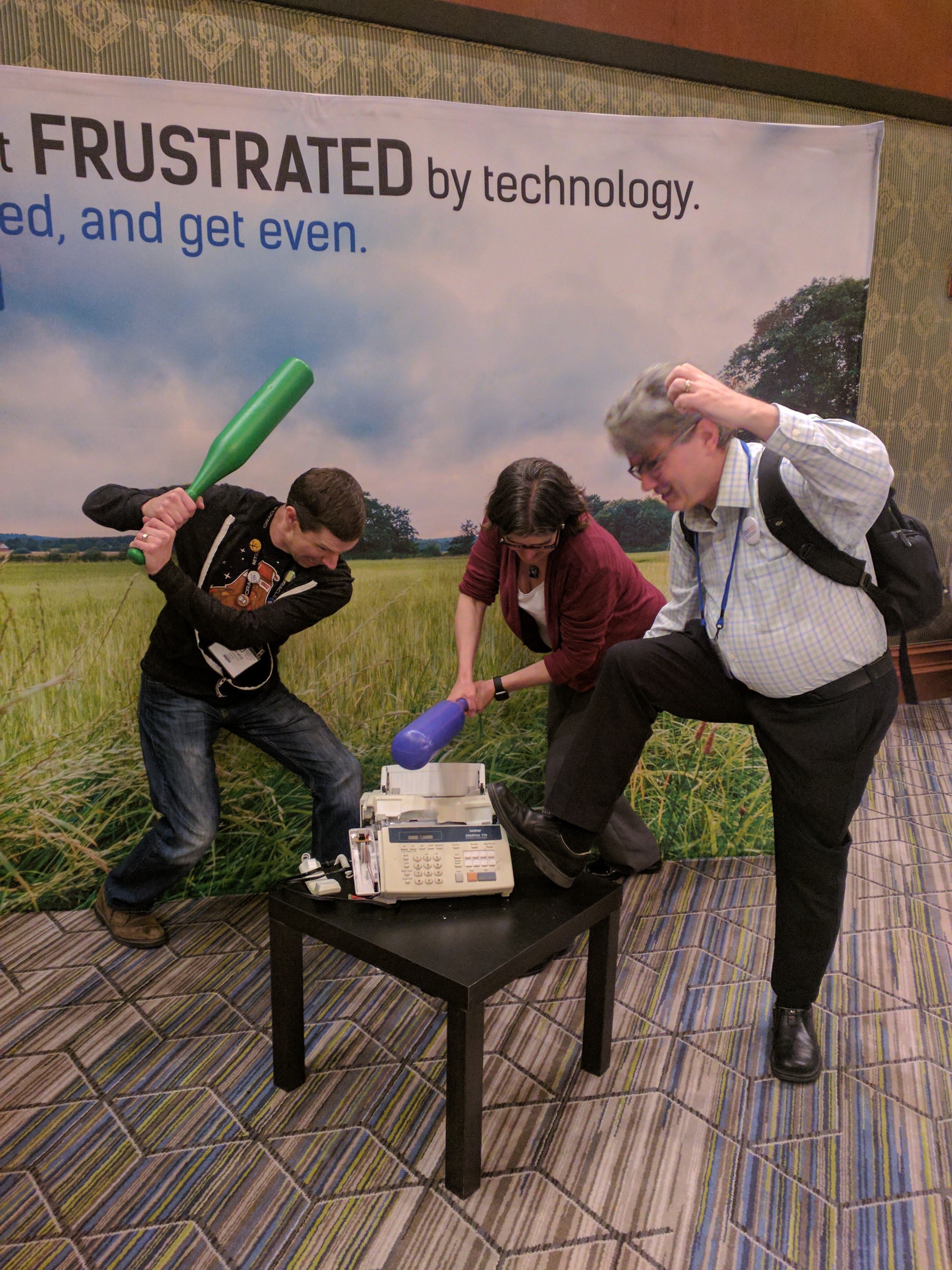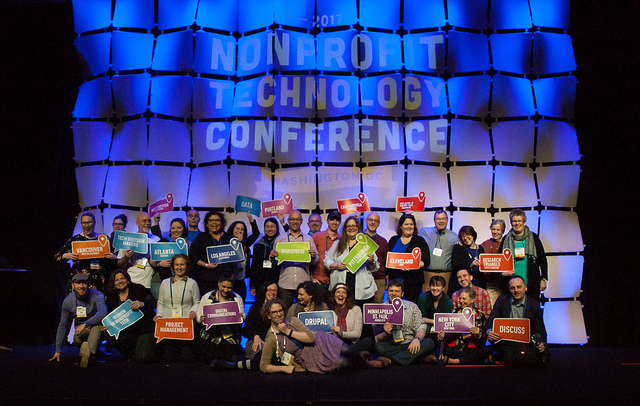My 17NTC Report
Photo: NTEN
I’m back from NTEN’s annual conference, the biggest one ever with 2300 attendees here in DC. NTEN’s signature NPTech event continues to pull off the hat trick of continual growth, consistent high quality content, and a level of intimacy that is surprising for an event this large. It’s a big, packed tech conference, but it’s also a few days with our welcoming, engaging community. Here’s my recap.
I attended three quality sessions on Thursday:
- I learned much about the challenges in offering shared IT services to nonprofits, with an in-depth look at the work of the Massachusetts Legal Assistance Corporation, who offer discounted, centralized IT to legal aid programs. Their biggest lessons learned have been about the need to communicate broadly and bi-directionally. Shared services benefit the budget at the cost of personalization, and clients need to both understand and have a say in the compromises made. You can learn a lot more by reading the Collaborative Notes on this session.
- Next, I learned how to move from a top-down, siloed organizational culture to a truly networked one (with great wisdom from Deborah Askanase and Allison Fine, among others). A great example was made by Andrea Berry, whose small foundation, Maine Initiatives, recently moved to crowdsourcing grant proposals, a move that is threatening to traditional funders, who want more locks on their purse-strings, but empowering to the community. Here are the notes.
- Finally I attended a powerful session on managing your nonprofit technology career, with great presenters (and friends (Johanna Bates, Cindy Leonard, and Tracy Kronzak (who just landed a gig at Salesforce.org). They made great points about how imposter syndrome can hold people back – particularly the “accidental techies” that come to their technology career through nonprofits. Their advice: plow through it. You’ll question your competence, we all do, but the trick is to be confident anyway. I stayed after the session helping out with some of the tough questions from people who are trying very hard to move into tech positions without the degrees and focused expertise sought. At nonprofits, we tend to be generalists, because we’re expected to do everything. Notes are here.
Friday was the day for my two sessions. In the morning, I presented with Edima Elinewinga of the U.N. Foundation on Calculating Return on Investment (ROI), where we made a solid case for not spending money without thoroughly understanding the financial and non-financial returns that we can expect. The overall pitch is that an organizational culture that attempts to predict the benefits of their investments, and checks their work along the way, will get better at it. The toughest questions were about measuring hard to quantify benefits like improved morale, or advocacy/outreach, but we had some gurus in the room who knew how to do some of these, and an overall pitch that , while not everything can be translated to dollars, tracking the soft benefits is important. The soft ones might not justify the purchase, but they should be recognized as benefits all the same. Notes are here. And here are the slides:
My second session, with Dahna Goldstein, was a timely one: Leading in Uncertain Times. With the current political climate having potentially deep impacts on nonprofits (including my own), we weren’t certain how this one would go, but we set out to offer helpful advice and best practices for rolling with and surviving hard times. It ended up being, in many ways, a fun session, despite me having three slides on “how to do layoffs” alone. We also had a roomful of executives, which helped, and an enthusiastic conversation. Here are the notes, and here are the slides:
On Saturday, I had a blast attending Joshua Peskay and Mary O’Shaughnessy‘s session on IT Budgeting. After covering all of the nuts and bolts of putting together an IT budget that, in particular, identifies and eliminates wasteful spending, they broke the room up into groups each putting together a quick tech budget. I was drafted (along with fellow senior techies David Krumlauf and Graham Reid) to act as the board charged with approving or denying their budgets, Project Runway-style. I now think that I’ve missed my calling and I’m looking for someone to produce this new reality TV show. Here are the notes.
Additional highlights:
- #ntcbeer! was a bit smaller than usual this year, due largely to my not getting my act together until Jenn Johnson swept in to save it. Didn’t matter – it was still the fun, pre-conference warm-up that it always ends up being. Next year we”ll go big for the tenth annual #ntcbeer in new Orleans.
- Dinner Thursday was a pleasant one with friends old and new from Idealware, TechImpact, Bayer Center for Nonprofits, and more, including my traditional NTC Roomie, Norman.
- Friday morning started with an Idealware reunion breakfast at the posh AirBNB that the Idealware staff were staying at. Great to see friends there, as well.
- Everywhere I turned, I ran into Steve Heye. Mind you, with 2300 people at the event, there were lots of friends that I never saw at all, but I couldn’t turn a corner without seeing this guy. What’s up with that? Anyway, here’s Steve, Dahna and I giving a fax machine the whole Office Space treatment:

I’ll admit at the end here that I went into his NTC, my eleventh, wondering if it was getting old. It isn’t. As usual, the content was rich, and the company was excellent. Nobody throws a party like NTEN!



Great summary, Peter!
Peter, I really enjoyed your sessions this year. Well Done! Plus it was awesome to have some drinks, food and fantastic conversation with you. But yeah, it was ridiculous how many times I bumped into you and enjoyed every minute of it (as usual). Great summary!
Peter,
I was pretty honored to have you in the room. When I saw you there, I thought “Hey, this guy pretty much knows everything about IT and I’m flabbergasted he thinks there’s more to learn from us!” Thanks for the nice write-up. I, too, am impressed as all get-out by Maine Initiatives’ achievements in turning their foundation grantmaking process upside down and inside out to better include stakeholders in the process.
Your Office Space photos is a gem! Thanks for sharing 🙂